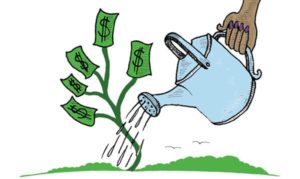October 20, 2020 – Since October is National Retirement Security Month, let’s hear it for everyone giving their all  on the job, and saving for the day when they can finally retire. They deserve cheers — especially those earning moderate incomes.
on the job, and saving for the day when they can finally retire. They deserve cheers — especially those earning moderate incomes.
But let’s also consider educating these workers about an important tool known as the “savers tax credit” or “saver’s credit” — officially, the Retirement Savings Contribution Credit. This provision makes it easier to save for retirement but is unknown to most Americans.
Unfortunately, even many moderate-income workers savvy enough to stay in their employer’s retirement savings plan don’t know that they may be eligible to claim the credit to help offset the cost of funding their retirement accounts. Taxpayers with adjusted gross income of $19,500 (single filers) to $65,000 (married, filing jointly) may be eligible for a credit of 10%, 20% or up to 50% on their tax returns.
A Transamerica Center for Retirement Studies survey found that 65 percent of female workers weren’t aware it existed. And women especially—given their odds of living longer, their histories of earning less, plus years out of the paid workforce for caregiving duties—need all the help they can get.
The answer to ‘Who Knew?’ in the headline is the bipartisan duo — Senators Rob Portman (R-Ohio) and Ben Cardin (D-Md.) — who introduced the Retirement Security and Savings Act in May 2019. That bill would expand the saver’s credit to make the credit refundable and to make more workers eligible for a 20% credit. It also directs the U.S. Treasury Department to educate the public about the credit and how to claim it.
It’s possible that an improved saver’s credit provision could pass as part of a year-end spending bill when the U.S. Congress reconvenes this fall. Yet another path forward could be within the much-anticipated retirement legislation from the House of Representatives by Ways and Means Committee Chairman Richard Neal (D-Mass.). One thing is for sure, advancement of this kind of public policy would provide some good news for many hardworking Americans at the end of a tough year.
This article was originally published by Cindy Hounsell, WISER President on 10/15/20 for IMPACT, the digital newsletter produced by the American Council of Life Insurers . IMPACT delivers digital news and views, focusing on trends and topics that impact Americans’ financial security.

